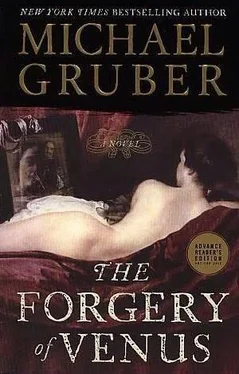We stayed late and got pretty oiled, and we walked back home through sleeping Trastevere in a light rain. When we got to the house it was clear that she was available, but I begged off, and that raised her eyebrow and produced a shrug. Whatever, signor . In fact, it was not Lotte mainly, but that whole thing seemed a little too planned, another way to inveigle me deeper into the circle of Krebs.
I told her I wanted to start in the morning; she said okay and went off to bed, and I did too. I woke up at first light. Or someone woke up, but it wasn’t in the bed I’d gone to sleep in and it wasn’t me.
Iawaken in a different bed, a huge thing with four posts and heavy velvet hangings. I smell cooking and a kind of incense, and underneath a sweet, unpleasant smell, maybe sewage-that’s what the world smells like. I have to piss, and I use the chamber pot I pull out of a little box by the bedside. I’m wearing a white embroidered night-shirt and a cap. I push the curtains aside.
A huge room with high, coffered ceilings and wall paintings, Zucchis mainly, the usual Roman unclothed nymphs; they make me irritable every time I see them. I have not slept well. I’ve dreamed again of being in hell, vast cliffs with eyes, iron streets populated with gargoyles, half-dressed harpies, and in the streets chariots going of themselves, spitting the stench of pitch and sulphur.
Servants attend me while I wash and dress. Pareja is sullen as usual, although I have permitted him to paint, in contravention to the codes, and why not? This is Rome, where everything is permitted, especially that which is prohibited.
I eat something-I forget what-in a large room overlooking the famous gardens. This is the Villa Medici. The duke allows me to stay here, as he did during my first visit, although as an honorary ambassador to His Holiness I should be lodged at the Vatican. I cannot bear to stay there, however; the food does not suit me-far too rich-and the meals formal and at set times. Here I can eat what I want, when I want, and I can work.
After my meal, I go down to the Trinitá to hear Mass, then return to my studio and work on a view I have made of a gate to the gardens. It is a small thing, but it gives me a particular pleasure, as it has no connection with a patron but is for myself alone, a landscape in the French manner, or the Dutch. I have never done such a thing before, and it makes a kind of cleansing after the Pope’s portrait.
At noon I eat again, this time at a table with some of the other guests, all people of rank, and none of them think it disgraceful to dine with a painter.
Now I command Juan Pareja to call for a carriage, and we leave the villa for our appointment at the house of my lord Don Gaspar de Haro, Marqués de Heliche, a great man among the Spanish in Rome, who favors me above all others of my profession. During the journey I am much engaged with my pocket book, where I list all the worrying arrangements I must make to fulfill His Majesty’s commission: gaining permission to make casts of famous sculptures, supervising the artisans making the casts, making sure they are properly crated, paying for the shipment, making sure the carters do not steal everything, viewing paintings for sale, making appointments for portraits of the notables who favor me and whose friendship is desired by His Majesty-never enough time and never, never enough money, the Titians alone cost over a thousand ducats and the majordomo at the embassy says there is no money. There is no money in all of Spain, it seems, or so I am told. Although it is the king’s will that these treasures be bought, every petty clerk defies me. As they say, too much meat on to roast and some will be burnt.
At the palazzo I am announced and led to a hall full of paintings. The paintings are very fine, but I have no chance to study them, for here is my lord of Heliche and his train. They are merry and an odor of wine and perfume floats above them. They are Romans in the main, and of a type that my lord’s father, far less his uncle the count-duke, would never have thought to entertain. I am introduced, I bow, they bow, the marqués takes my arm, and we go off privily to tour his gallery. We talk of paintings: he is passing knowledgeable, for one so young, and avid for more treasures; he condemns me for driving up the market by my visit and my gold from Madrid, although there is hardly any. We stop before a Venus with a Mirror, a copy after the Titian that hangs in the Alcázar. He says, I want one like that. A copy, my lord? No, a painting, a new painting. But we will speak of this further. First I wish to show you a prodigy. You will hardly believe this, Don Diego, there is nothing like it in Spain.
We move up a stair and down a hallway. There is a room from which issues a familiar odor. He signs to the footman to open the door without sound, and we stand in the doorway. Inside there is an easel and a man in a long smock and turban painting at it, and a model, a woman, sits holding a swaddled plaster baby. The man is painting rapidly, placing a blue glaze. A Venetian, I think, or one trained in their style.
My lord speaks low: “What do you think, Don Diego?”
I answer: “It is well enough done. The forms have some strength at least; the colors are clear and harmonious. A young man, I think, with little experience. The composition is not all it could be.”
In the same low voice he says, slyly now, “You are entirely mistaken in this, I fear.”
I say, “Then I bow to your superior knowledge of the painter’s art, my lord.”
“No, that’s not what I meant,” he says. “I meant it is not a young man. It is not a man at all!”
With that he cries out, “Leonora!” And the painter turns around, and I see it is a young woman. She stands frozen a moment, startled, brush in hand. The marqués strides into the room and embraces the woman in a most lascivious way, although he is married, and recently too, to a girl reputed to be the beauty of Italy, and rich. Still holding her to his body, he calls to me, “Is this not a prodigy, Don Diego, a woman who paints! Can you imagine what they would say in Spain? My treasure, this is Don Diego de Velázquez, the king’s painter, come to Rome to buy every painting that can be bought and impoverish all us poor collectors. Don Diego, it is said that you allow your slave to paint, but I think I have you bested in this one: I have the honor to present to you Leonora di Cortona di Fortunati.”
The woman smiles indulgently. The marqués bends to kiss her neck, and his hand slips between the buttons of her smock. The model looks away and blushes. I am thunderstruck myself.
The woman pushes him away; he resists, laughing; she taps him on the nose with her brush tip and his nose becomes bright lapis blue. He touches his nose, goggles at his hand. A look of anger starts on his face, but he turns it into a toothed grin like a carter’s and lets free a bellow of laughter.
“Clean me!” he orders, and she does, with a rag dipped in turpentine.
“Pah!” he cries. “I will stink like a damned painter all day. Look here, Don Diego, this is what I want you to paint.” He pointed at the woman.
“A Madonna and child, my lord?”
“No, of course not, God blast you! What would I do with yet another Madonna and child? No, her, Leonora, I want you to paint her as Venus with her mirror.”
I look at the woman with the paint rag still in her hand, and she looks back at me. Her eyes are sea-gray; the wisp of hair that has escaped from her turban is auburn. She has a blunt, oval face with a high forehead, snub nose, and strong chin, the face of a sharp market woman, not a beauty; but there is the disturbing way she’s staring into my eyes, slightly mocking, but also with a deeper complicity, as if we alone in that room understood some important secret. I have never been looked at like that by a woman, not my wife, not the women of the court. It unnerves me and even makes my voice shake a little when I say, “A Venus, my lord; do you mean unclothed?”
Читать дальше












